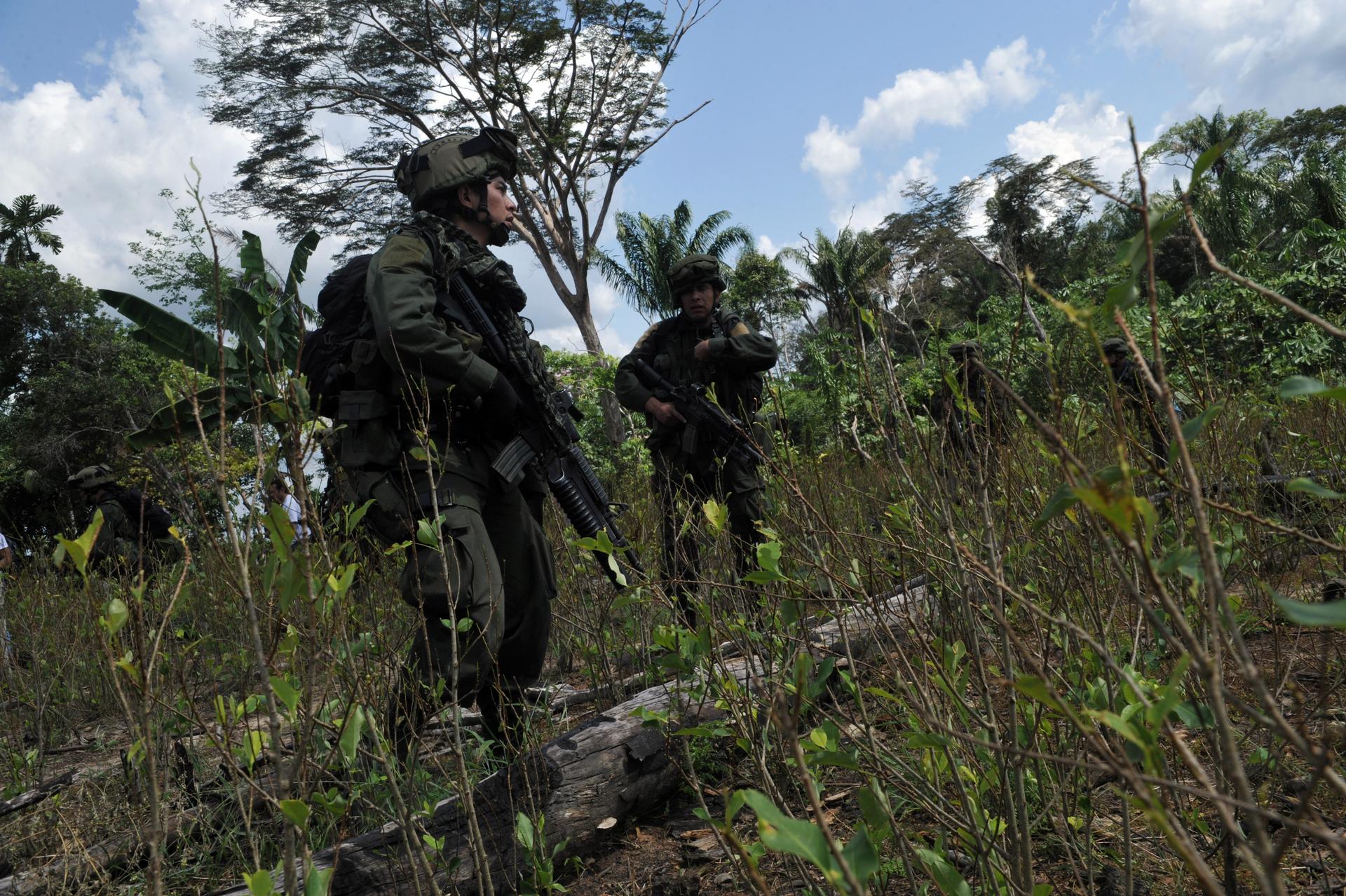Colombians face deadly risks of returning to stolen land: HRW report
Anti-narcotics police officers walk across a coca plantation on their way to blow up a lab for processing cocaine base from the Revolutionary Armed Forces of Colombia (FARC) in the municipality of Puerto Concordia, Meta department, Colombia, on January 25, 2011.
BOGOTA, Colombia — Colombia is a land of grandiose legal norms.
Take the South American country’s 1991 constitution, which is a soaring masterwork promoting broad citizen participation, equal rights and peace.
Unfortunately, Colombia — which remains profoundly unequal and torn by a half-century-old guerrilla war — is also a land where such aspirational language is routinely ignored.
So perhaps it’s no surprise that a landmark Colombian law to restore millions of acres of stolen and abandoned land to people displaced by the fighting is being derailed by threats, intimidation and assassinations, according to a report released today by Human Rights Watch.
Colombian President Juan Manuel Santos “is making a serious and unprecedented effort to return land, but violence and intimidation against displaced families attempting to return home threaten to sabotage his banner human rights initiative,” said José Miguel Vivanco, Americas director at Human Rights Watch.
The country’s drug-fueled guerrilla war has driven nearly 5 million Colombians off their land. That gives Colombia one of the world’s largest populations of internally displaced people, who are estimated to have left behind about 15 million acres — roughly the area of Maryland and Massachusetts combined.
Many of these properties have been snapped up by drug lords, rebels or the paramilitaries that fought the guerrillas and also smuggled cocaine. The land grabs have helped give Colombia one of the most unequal ratios of property distribution in Latin America and help explain why more than 60 percent of people living in Colombia's countryside are poor.
The 2011 land restitution law was supposed to right some of these historic wrongs. It has already had some impact by helping to pave the way for peace talks between the government and the Revolutionary Armed Forces of Colombia, or FARC, now under way in Cuba. The FARC first took up arms in the 1960s due, in part, to demands for land reform.
If fully implemented, the law could help thousands of families devastated by the war to rebuild their lives.
Instead, the 184-page Human Rights Watch report, titled “The Risk of Returning Home,” documents killings, death threats and a second round of forced displacement against Colombians attempting to recover their land under the provisions of the new law.
The report details the murder of 21 displaced land claimants and leaders since 2008 as well as 80 cases in which victims received serious threats. In more than two dozen other cases land claimants fled their homes yet again because of abuses related to their efforts to reclaim land.
In one chilling case in the report, a woman told Human Rights Watch that paramilitaries had forced her family from their farm in northern Cesar department in 1999, and then killed her husband, brother and son. Evidence suggests that a paramilitary commander’s brother acquired their farm and repeatedly threatened the woman when she returned to Cesar to reclaim it.
In one phone call, the paramilitary’s brother told her: “Remember what happened to your brother and son.” Last year, the woman subsequently fled the region for a second time.
Part of the problem has been the Colombian authorities’ failure to curb the power of a new generation of drug-trafficking gangs. These gangs inherited the criminal operations of the country’s main paramilitary units that disarmed in the mid-2000s but were responsible for many of the land grabs. More recently, these successor gangs have carried out a large share of the threats and attacks targeting displaced land claimants.
All told, less than 1 percent of the 17,000 forced displacement cases investigated by Colombian authorities have led to convictions, according to the report. As a result, those most interested in retaining control of the wrongfully acquired land often remain off the authorities’ radar and readily able to violently thwart the return of the original occupants.
“The ongoing threats and attacks are entirely predictable given Colombia’s chronic failure to deliver justice,” Vivanco said. “Unless Colombia starts to ensure justice for abuses against land claimants, they will continue to be killed, threatened, and displaced.”
